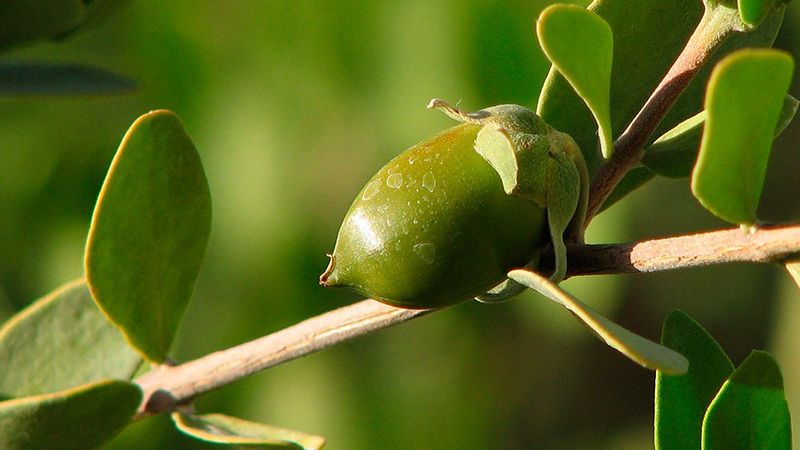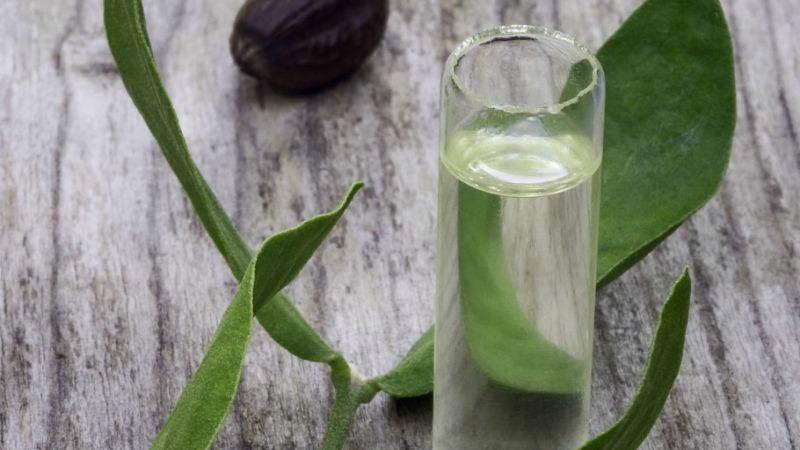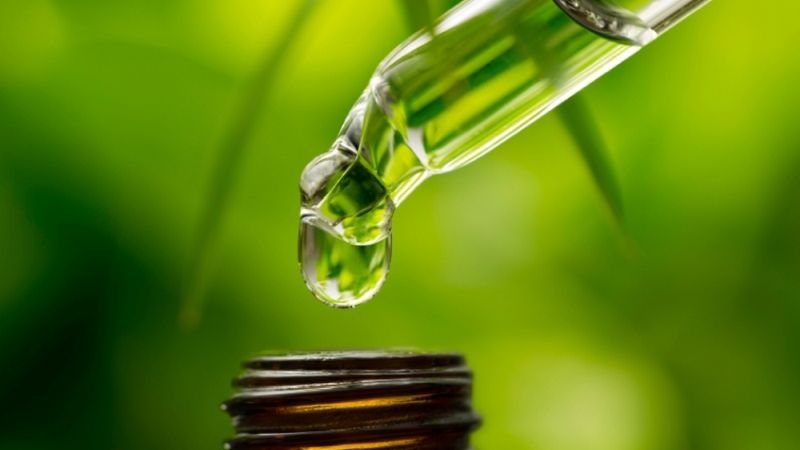Jojoba oil
|
|
Time to read 4 min
|
|
Time to read 4 min
When we think of topical oils, we usually think of benefits that are only skin deep. Today’s ingredient, however, is one that’s safe, gentle and able to rejuvenate skin on a cellular level. Pretty cool, right? Keep reading to see why jojoba oil deserves a place in everyone’s beauty routine.
Table of content
Jojoba oils come from the nut of a bush that grows naturally in the southwestern part of the U.S. It’s long been used by Native Americans for treating wounds and bruises. Beginning in the 1970s, it made its way into mainstream cosmetics thanks to its innate ability to rejuvenate the skin. Despite its name as an oil, it’s actually a liquid wax, making it extremely shelf-stable and easy to use.
Jojoba oil is primarily made up of mono-ester, long-chain fatty acids, along with a very small percentage of triglyceride esters. Its genetic makeup is particularly beneficial for skincare applications because fatty acids help skin retain moisture without increasing oily residue.
Fatty acids can even help decrease cellulite and certain signs of aging. Jojoba oils also includes vitamin E and B-complex vitamins, which nourish from the within, re-energizing the cells and fighting free radicals. Because of its fatty acids and vitamin-rich profile, the main jojoba oil uses today are related to the face and hair. Working as a moisturizer, cleanser and cell regenerator, jojoba oil can also:
Jojoba oil is often more effective when paired with other skin-friendly ingredients. Similar to its use as a carrier for essential oils, it can work synergistically with other ingredients (like hemp oil or shea butter) to enhance their benefits. It can also be found as strictly 100% jojoba oil.
Look for a pure, cold-pressed variety that’s harvested from organic sources. Cold-pressed is key because the fragile nutrients within the oil can be destroyed when processed in high heat. Just a note: Cold-pressed oil may also be labeled as “unrefined.”
Avoid jojoba oil that is refined, second-pressed or solvent-extracted because these oils are of much lower quality and probably won’t provide the results you’re looking for. As for where to find it, the best jojoba oils are usually found online or at natural health food stores.
Whether strictly oil or a jojoba mix, it’s safe to use directly on hair and skin without dilution. A drop or two can be added morning and evening to a facial cream or to a hair conditioner. You can even use it as a leave-in conditioner by rubbing a couple drops in the palm of your hands and applying to damp hair.
Pro Tip: If you color your hair, apply jojoba oil before swimming to prevent permanent color loss due to chlorine! To apply it to the skin, a simple cotton pad or even just the tips of your fingers will do the job just fine. If you use essential oils, jojoba is great to keep on hand as a safe, gentle carrier oil.
We use it in a verity of our products because of how many benefits it offers. Like in our USDA Organic eye Cream for under eye bags, crow’s feet, and puffiness. Or in our premium exfoliating sugar scrub to rejuvenate dull skin, dry skin, acne, cellulite, and more. You can also find it in our Facial Oil to remove makeup while nourishing and repairing your skin with each wash.
Jojoba oil’s wow factor lies in its combination of safety and efficacy. In fact, its chemical makeup is similar to that of the sebum naturally occurring in the skin. It can be used directly on the skin and hair without harm and is able to cleanse, moisturize and condition – without any oily residue. If you haven’t experienced jojoba oil for yourself yet, what are you waiting for? Try it today!
Jojoba oil is best for moisturizing skin, balancing oil production, soothing dry or irritated skin, and nourishing hair. It's also great for makeup removal and as a carrier oil for essential oils.
Jojoba oil comes from the seeds of the jojoba plant, scientifically known as Simmondsia chinensis.
Yes, jojoba oil is safe for the face. It's non-comedogenic, meaning it won't clog pores, and is suitable for all skin types, including sensitive skin.
Jojoba oil can help promote hair growth by moisturizing the scalp, reducing dryness and irritation, and nourishing hair follicles, but it doesn't directly stimulate hair growth.
Resources
1. https://www.webmd.com/diet/health-benefits-jojoba-oil
2. https://www.healthline.com/health/beauty-skin-care/jojoba-oil-for-face
3. https://www.health.com/jojoba-oil-benefits-8625319
Latest News




